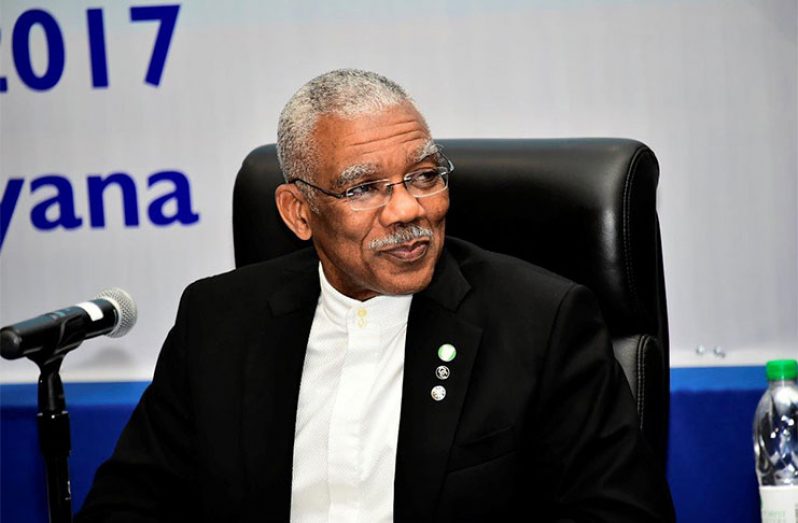— President maintains GECOM must advise on readiness for elections before date is fixed
— insists on credible elections, backs GECOM on house-to-house registration
PRESIDENT David Granger said he will proclaim a date for elections when the Guyana Elections Commission (GECOM) advises him that it is in a state of readiness for the conduct of credible, fair and free elections.
His statement comes at a time when the opposition, the People’s Progressive Party/Civic (PPP/C) is calling for an early date to be set. In fact, on Saturday, Opposition Leader Bharrat Jagdeo wrote the Head of State requesting that he issue a proclamation dissolving the 11th Parliament and fix a date for the next General and Regional Elections.
The elections, Jagdeo said, must not be held beyond September 18, 2019. The opposition leader also called for the resignation of the President and Cabinet, on the basis that a no-confidence motion was successfully passed against the A Partnership for National Unity + Alliance For Change (APNU+AFC) government.
But ahead of that letter, President Granger during the Public Interest Television Programme, said the government, through the National Assembly, has financially equipped GECOM to prepare for elections; however, a date cannot be set until the elections commission indicates that it’s capable of conducting credible elections.
GECOM, through its attorney Stanley Marcus, has long stated that it could facilitate credible elections only after December 25, 2019, when the process of house-to-house registration is completed. It has said that it cannot conduct elections on an expired List of Electors and house-to-house registration has become necessary to produce a new and credible list. That countrywide exercise commenced on Saturday.
“At this stage, only the elections commission has the authority to run elections, not the Executive, not the National Assembly, not the President; and I am going to abide by whatever decisions the elections commission takes with regard to the preparation of the list. I will abide by the advice of the elections commission on when to call elections.
Right now it is only the elections commission that could determine the time and the form of elections, and I am prepared to abide by their decisions,” President Granger said.

His position is one which was taken by Jagdeo when he was serving as President of Guyana in 2006. In an address to the nation, the then President had said: “The law says that GECOM shall define the form of verification of the list or may decide on verification and will decide on what form it will take. Not the PPP, not the PNC, not any party, GECOM. That’s a constitutional body, independent just like the courts.”
SUPPORT
On the grounds that the list, in addition to being expired, is bloated, President Granger, the People’s National Congress Reform (PNCR), the A Partnership for National Unity (APNU), and the A Partnership for National Unity + Alliance For Change (APNU+AFC) government have supported the process of house-to-house registration.
“We accept that the list is bloated, we accept that there were far too many persons on the list who might be ineligible, and we believe that many people who are not on the list are eligible and should be on the list,” the President explained.
The President said he has taken note of newspaper articles, that the elections commission started house-to-house registration on Saturday, July 20, 2019. “…These are not my doings, these are the doings of the elections commission and I support them. We should have a clean and credible list,” he posited.
In giving an overview of government’s posture in the current political construct, President Granger said he and his government have been fully compliant with the rulings and consequential orders of the Caribbean Court of Justice (CCJ). He said that though the term interim government is not defined in the Constitution of Guyana, the government has accepted that position in keeping with the CCJ’s orders.
“There is nothing in the Constitution which defines interim status, but in the jurisdictions which adhere to the Westminster system, if you want to call it that, in Canada, Australia and other countries, we have consulted with the laws, and interim government means that we do not for example pass a budget; we obviously got to keep government running, the routine functions of government, I cannot undertake state visits, and sign agreements with foreign countries, we have to limit our expenditure, we have to ensure that we don’t embark on any controversial projects, so there are about half of a dozen or more conventions with which we have to comply to ensure that the government restrains expenditure, restrains its actions,” he explained.
He added: “It doesn’t mean that the government is out of office; it doesn’t mean that the government ceases to function. There cannot be a void; you cannot have a country that is ungoverned.”
The President maintained that everything he has done thus far is within the confines of the Constitution and the decisions of the CCJ.
Under the Jagdeo presidency, elections were delayed twice. In 2001, General and Regional Elections were due on January 17 in accordance with the Herdmanston Accord; however, Jagdeo while as President, had cause to delay the elections based on advice of the GECOM. Again in 2006 under Jagdeo’s presidency, elections were delayed. The constitutional deadline was August 4, 2006, but GECOM was unable to meet it.



.jpg)









